They always say reading is a comfort and a source of knowledge. Recovery books are among them and a continuing mental health resource. They offer practical advice, encouragement, and insight for those wanting personal growth or healing. This blog post explains how these books help improve mental health.
Power of Shared Experiences
Recovery books often include stories from individuals with similar experiences. Such stories strike a chord with readers searching for answers to their dilemmas. People are less lonely when they read about others who have successfully gotten through a rough spot. Finding these shared experiences builds camaraderie and reassurance in the reader that they are not alone.
Offering Practical Strategies
Many books on recovery offer more practical advice. The techniques and methods outlined here are solutions to these types of problems, to help with anxiety, stress, or other mental health issues. These may include mindfulness exercises, cognitive behavioural approaches, and meditation techniques. These are books in which concrete tools are offered to help readers take concrete steps toward improvement. If you’re looking for a helpful resource, you can buy recovery books that provide insights and practical solutions for personal growth.
Inspiration and Hope
One common thread in all recovery texts is hope. Successful stories of change and tenacity inspire readers to believe that they can, too! Through others, one becomes awed, a believer that the climb can be done. The addition of a glimmer of hope can motivate readers to commence their healing.
Encouraging Self-Reflection
Read O&A from recovery books. Indeed, recovery books often encourage self-reflection. They guide you to dive into your feelings and actions via exercises and questions. Readers are assisted in spotting tendencies and triggers through this self-reflection, potentially resulting in greater self-awareness. And the first step in recovery will always be to understand yourself.
A Feeling of Empowerment
One of the most common elements in all recovery books is empowerment. They are centered around individual choice and the power to change. They empower the reader to take control of their mental health by simply reinforcing the notion that change is possible. It can help you feel more confident and encourage you to take charge of your well-being.
Fostering Resilience
Resilience is described as the capacity to recover quickly from difficulties. Recovery literature tends to focus on humans who have conquered overwhelming obstacles. The experiences these stories bring teach us never to give up and to learn to adapt. These examples can guide readers in building their resilience and being better prepared for more challenging times.
Building Emotional Literacy
Understanding emotions and their impact is a vital component of mental health. Some of the most popular recovery books emphasize emotional literacy and how to identify and articulate your feelings. Emotional Intelligence leads to effective management of responses to conflicting situations and stress. So it makes positive relationships and positive states of your mind.
Encouraging Community and Support
Certain books about recovery focus on the idea of community. They underscore the importance of support networks in recovery. These books create a connection that drives home the point of reaching out for help and cultivating supportive and healing relationships.
Diverse Perspectives and Inclusivity
The literature of recovery is broad, covering various topics and stages. This variety varies from the content, ensuring that readers from different walks of life will find something that is applicable and relevant to them. However, by centering inclusive narratives, they also appeal to a more general audience, offering something for everyone and ensuring that all individuals find the guidance they need.
Promoting Long-Term Growth
Although recovery books are immediate, they are also long-lasting, prompting the reader to develop and grow even further than this book. These books encourage a lifelong passion for self-improvement, which leads to a healthy mindset maintained over time.
Conclusion
Recovery books are excellent resources for mental health support. They provide something tangible: camaraderie, actionable hacks, and motivation. Recovery literature is a vital part of personal growth, where the power is in empowerment, resilience, and emotional literacy. These books provide a strong foundation for mental health support, no matter if someone is in search of comfort, guidance, or growth.
Disclaimer: The information provided in this article is for general informational purposes only and is not intended as medical or therapeutic advice. While recovery books can be a valuable resource for mental health support, individuals experiencing mental health concerns should consult with a qualified professional for personalized treatment and care. Results may vary, and the effectiveness of recovery books depends on individual needs and circumstances.


















